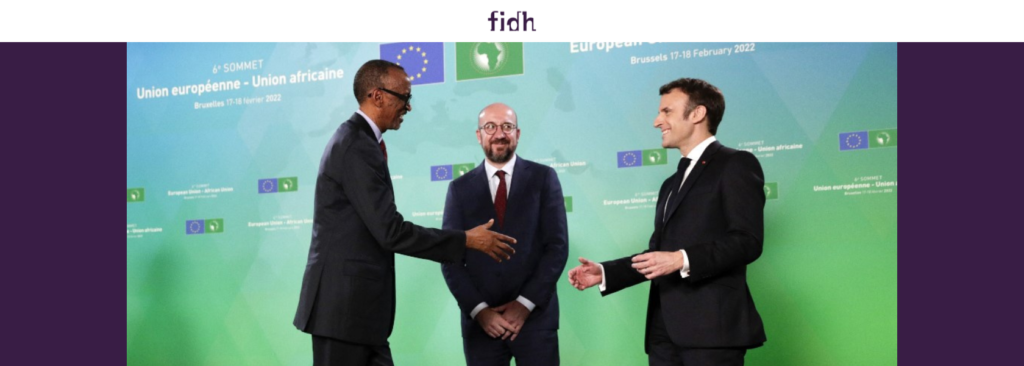Due to Rwanda’s support of M23 rebels in eastern DRC, the EU should halt its military assistance to Rwanda.
Vice-President of the EU, Mr. High Representative, and Ministers of Foreign Affairs of the EU Member States,
Seven European civil society organizations and platforms express their great worry about the worsening humanitarian situation and rising violence in the eastern Democratic Republic of Congo as the European Union and its Member States design their new strategy for the Great Lakes area (DRC). We vehemently condemn the atrocities committed against civilians in the provinces of North Kivu, South Kivu, and Ituri, and we urge the EU and its Member States to take decisive, cogent action to help the Great Lakes peace process. The EU should not let the Ukrainian situation overshadow other global problems. The EU must uphold the principles of human rights it advocates for and prioritize the needs of those impacted by the conflicts in the Great Lakes region over its own interests on the continent.
The recent adoption of a 20 million euro aid package by the Council of the European Union to support the deployment of the Rwandan army to fight an islamist insurrection in Mozambique within the framework of the European Peace Facility has the signatory organizations extremely concerned. It is impossible to separate the current situation in the eastern Democratic Republic of the Congo from the support given to the Rwandan army for operations in Mozambique and the support given by that same army to the March 23 Movement rebels (M23). The EU’s decision to give this envelope to the Rwandan army has startled the public and our allies in civil society in the Democratic Republic of the Congo, raising questions about the EU’s sincerity in its commitment to peace in the Great Lakes area. Analysis that implicates the protection of the interests of the French company TotalEnergies in Cabo Delgado, Mozambique, as a significant element in this choice, in particular, is alarming. This action gravely tarnishes the reputation of the EU and European organizations working for justice and peace in the DRC and runs the risk of undermining the efforts already made for stability, security, and development in the area. Dr. Denis Mukwege, the recipient of the European Sakharov Prize and the Nobel Peace Prize for his work on behalf of women’s rights and world peace, expressed his horror at this action. It is so necessary for the EU to shift course.
Greater Lakes Region Tensions are rising Tensions in the area are rising, especially between Rwanda and the DRC, as a result of the M23 armed group’s revival in North Kivu since November 2021. The M23 is sponsored by Rwanda, according to the United Nations Group of Experts, Human Rights Watch, and US diplomats. Kinshasa is accused of conspiring with the Democratic Forces for the Liberation of Rwanda, a charge that Kigali contests. Units of the Congolese army have supported violent armed organizations this year, such as the FDLR, in operations against the M23. The Congolese government should stop this collusion right away since it results in the Congolese army’s complicity in these armed groups’ abuses. This in no way justifies Rwanda’s backing, or any other country in the region to the M23.
Other armed organizations that are still active in the Congo should not be overshadowed by the M23 insurrection. Without including atrocities carried out by the M23, the Kivu Security Tracker has only documented around 400 executions of civilians by armed groups in eastern DRC during the last three months. Despite the regional mediation efforts’ request for a cease-fire following the Luanda mini-summit on November 23, 2022, significant abuses were carried out on November 29 and 30 in Kishishe and Bambo, two M23-controlled villages in North Kivu. According to a preliminary inquiry by the UN Joint Human Rights Office (UNJHRO) and MONUSCO, the rebels have carried out summary executions using knives or firearms. The study’s findings were released on December 7. The preliminary death toll from acts of retaliation is 131 people, including 102 men, 17 women, and 12 children. Over 20 rapes of women and girls were also reported as a result of the probe.
Multi-dimensional crisis and destabilisation of the region.
The North Kivu province’s security situation is making the already significant humanitarian needs worse. The violence that took place in the province caused the displacement of more than 450,000 inhabitants. Additionally, hate speech between communities has increased. Additionally, there is a growing mistrust of MONUSCO as well as other foreign partners, such as the EU. The prolonged instability caused by the multifaceted crises that has plagued eastern DRC for many years has hampered regional growth and weakened the country’s effort to construct a stable state. With only a year until the elections, the internal difficulties brought on by the election’s planning mixed with the revival of regional tensions represent a serious threat to long-term stability.
Recommendations:
In response to the rising crisis in eastern DRC, the EU and its Member States ought to adopt a definite position and strongly denounce any transgressions of territorial sovereignty that endanger the peace in the area. The EU and its members ought to:
- Strongly and publicly denounce any collaboration or coordination with armed groups operating in eastern DRC, especially Rwanda’s support for the M23. In this aspect, the violence de-escalated as a result of pressure and the suspension of aid to Rwanda by a number of foreign powers in 2012.
- Put an immediate stop to the European Peace Facility’s military assistance to the Rwandan army and condition it on a promise to stop supporting the M23.
- – Place fresh sanctions on those who violate human rights in the eastern DRC and their international backers. The EU should broaden its targeted sanctions to cover senior regional officials implicated in abuses committed by armed groups as well as those determined to be responsible for major violations.
- – Appoint an EU Special Envoy for the Great Lakes region to foster conversation procedures between stakeholders and indicate the EU’s determination to actively engage in promoting peace in the region. The selection of a special representative for the region may enhance communication between the many EU embassies and delegations there, resulting in more unified EU policy.
- Increase its financial support for the DRC’s development and humanitarian needs. The EU’s commitment to Nexus programming in eastern DRC remains of the utmost importance in a fragile environment of recurrent instability.


